Fan sentiment plays a strong role in shaping betting odds, often causing fluctuations driven by collective emotions, enthusiasm, or skepticism. As fans express their support or doubts on social media and surveys, bookmakers and bettors react, sometimes overriding objective data like team performance. While sentiment can influence market trends and odds movements, it’s not always reliable due to biases, external factors, or noise. To better understand how fan mood impacts betting odds, keep exploring these intriguing connections.
Key Takeaways
- Fan sentiment can influence betting odds by shaping public perception and betting behavior, often causing market shifts before outcomes are clear.
- Social media monitoring and surveys help quantify fan emotions, which may correlate with odds movements but are affected by external factors.
- Positive fan sentiment often leads to increased betting volume on favored teams, impacting odds through market adjustments.
- External factors like injuries or weather can confound the correlation between fan sentiment and odds fluctuations.
- Overreliance on fan sentiment risks bias and inaccuracies, highlighting the importance of integrating multiple data sources for reliable predictions.
The Role of Fan Sentiment in Sports Markets
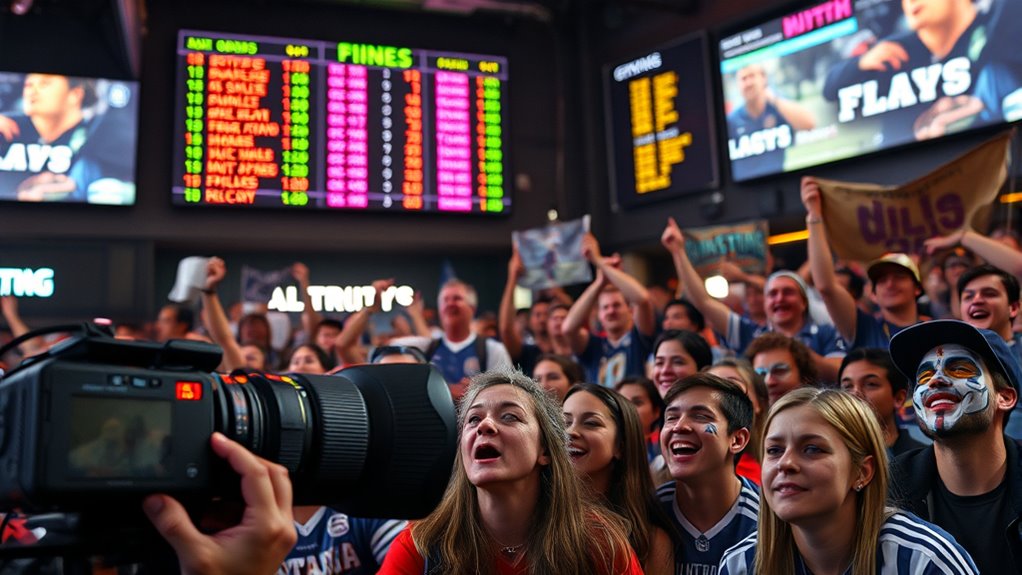
Fan sentiment plays a significant role in shaping sports markets because it directly influences betting behavior and market dynamics. When fans feel strongly about a team or player, their emotions can sway their betting choices, sometimes overriding objective analysis. Player psychology is affected by fan sentiment, as players often feed off the crowd’s energy, impacting their performance and, ultimately, betting odds. Additionally, fan demographics—such as age, location, and cultural background—shape collective opinions and biases, fueling specific market trends. This collective enthusiasm or skepticism can create betting patterns that influence odds adjustments. Your understanding of how fan sentiment interacts with player psychology and demographics gives you a clearer picture of why certain markets move in predictable ways, driven by the pulse of the fanbase. Recognizing the importance of anime films and animated movies in entertainment preferences highlights how cultural influences can also shape collective behaviors and market trends beyond sports.
How Betting Odds Are Calculated and Adjusted
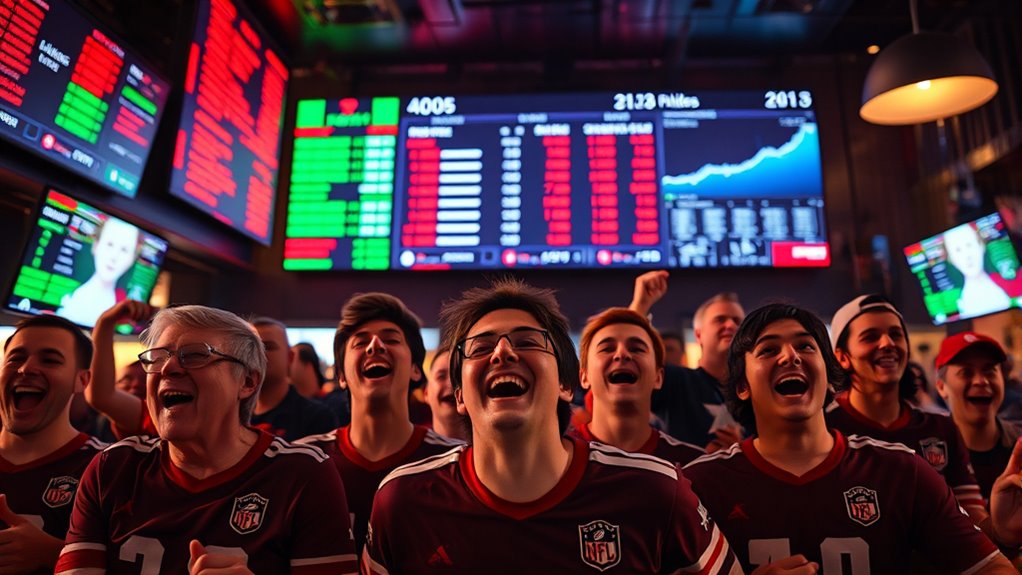
Betting odds are determined through a combination of statistical analysis, market factors, and the collective expectations of bettors. Odds calculation involves evaluating team performance, player stats, and historical outcomes to estimate probabilities accurately. However, these initial odds aren’t set in stone. Market adjustment occurs as bets come in, shifting the odds based on betting volume and money flow. If a lot of bettors favor one side, bookmakers adjust the odds to balance their risk and ensure a profit regardless of the outcome. This dynamic process helps maintain market efficiency and reflects real-time sentiment. Additionally, understanding the contrast ratio of a projector can enhance the viewing experience, especially when watching high-contrast content. Ultimately, odds calculation provides a starting point, but continuous market adjustment fine-tunes the odds to mirror current betting activity and expectations.
Measuring Fan Emotions Through Social Media and Surveys
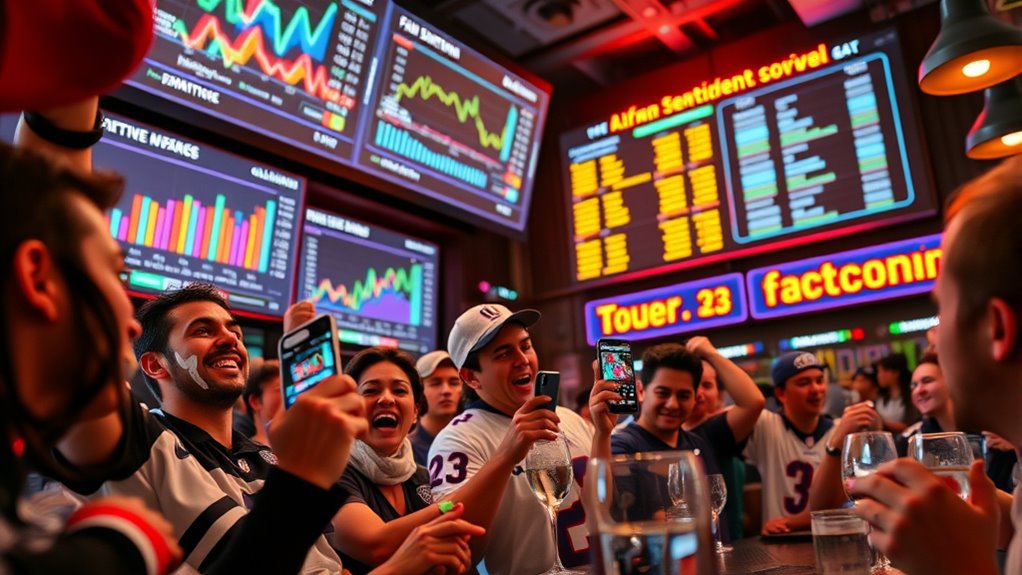
Social media platforms and surveys have become essential tools for gauging collective emotions and opinions about sports teams and events. By analyzing fan polls, you can quickly capture the overall mood and sentiment of supporters, providing real-time insights. Social listening allows you to monitor conversations, hashtags, and comments across various channels, revealing trends and shifts in fan feelings. These methods help you understand how fans feel about team performance, players, or upcoming games, which can influence betting behaviors. Combining quantitative data from fan polls with qualitative insights from social listening offers a thorough view of fan emotions. This approach helps you identify patterns and gauge the intensity of support, making it easier to predict how fan sentiment might impact betting odds.
Case Studies: When Fan Mood Influenced Odds Movements
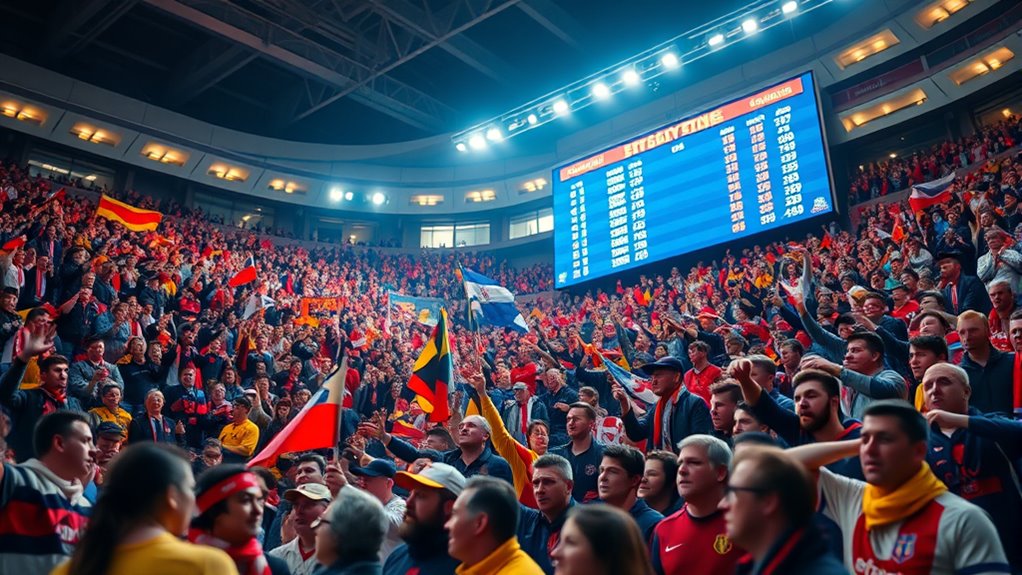
When supporters’ emotions run high, their collective mood can considerably sway betting odds, sometimes even before game outcomes are clear. In these cases, player psychology often becomes affected by the heightened fan sentiment, influencing perceptions of individual performance. Media influence plays a key role, amplifying fan reactions and shaping public opinion, which in turn shifts betting markets. For example, during a major upset, overwhelming media coverage and passionate fan support can cause bookmakers to adjust odds prematurely, reflecting perceived momentum rather than actual game data. These case studies highlight how emotional supporter behavior, fueled by media narratives, can lead to noticeable odds movements before players even step on the field. Recognizing these patterns helps you understand the complex interplay between fan sentiment and betting dynamics. Additionally, understanding Gold IRA Rollovers can provide insight into how strategic financial decisions are influenced by external factors such as market sentiment and media coverage.
The Psychological Impact of Fan Sentiment on Bettors
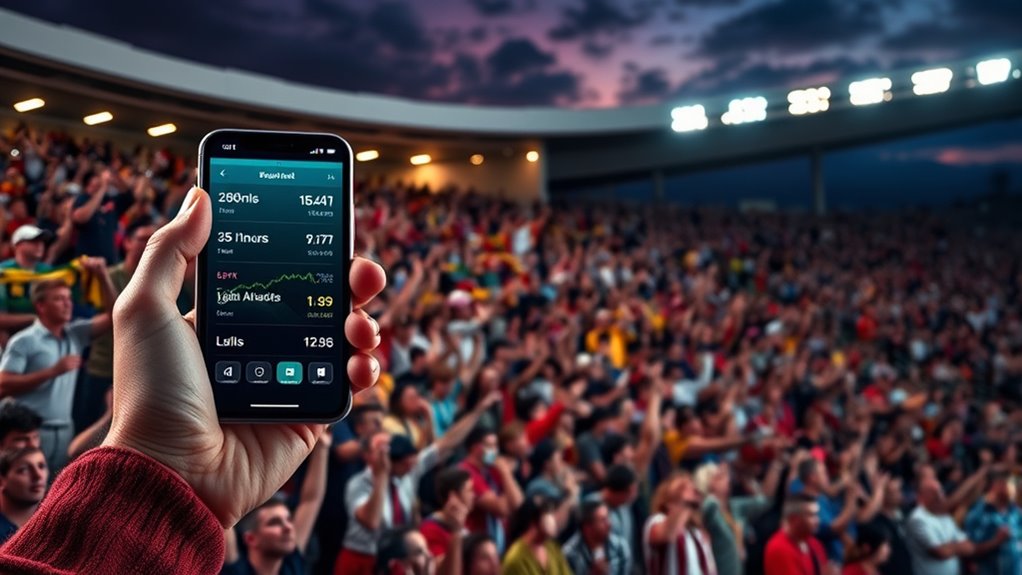
Your emotions can strongly influence your betting decisions, often leading you to favor your favorite team regardless of the odds. Groupthink and herd behavior can make you follow the crowd, amplifying biases and clouding judgment. Recognizing these psychological influences helps you make more rational choices and avoid costly mistakes. Incorporating awareness of cultural and regional traditions can also help you understand how external influences shape your perceptions and biases during betting decisions.
Emotional Bias Influence
Fan sentiment can strongly influence bettors’ choices, often leading them to favor their favorite teams regardless of objective odds. This emotional bias can cause perception distortion, making you overestimate your team’s chances. Here’s how it affects you:
- You might ignore statistical evidence, trusting your emotional connection instead.
- Your perception of a team’s likelihood to win becomes skewed by loyalty, not facts.
- You may place bets based on hope or bias, rather than rational assessment.
- Recognizing perception distortion through analytics data can help you maintain objectivity.
This emotional bias clouds judgment, making you vulnerable to misjudging the true odds. Recognizing this perception distortion helps you stay more objective, avoiding decisions driven purely by sentiment rather than data. The key is to balance emotion with rational analysis to make smarter bets.
Groupthink and Herding
Groupthink and herding occur when bettors follow the crowd’s opinions rather than analyzing the actual odds or data. This herd mentality, driven by groupthink dynamics, can lead to irrational betting decisions. When many bettors act based on what others believe, herding behavior intensifies, often ignoring objective information. To highlight this, consider the following:
| Factor | Effect | Result |
|---|---|---|
| Social influence | Encourages conformity | Skews betting patterns |
| Limited info | Reduces independent analysis | Increases herding tendency |
| Fear of missing out | Promotes quick decisions | Amplifies groupthink |
| Popular opinion | Overrides statistical data | Creates biased odds |
| Market movement | Self-fulfilling prophecy | Reinforces herd behavior |
Understanding these dynamics helps you recognize when groupthink influences betting, leading to more informed decisions. Additionally, awareness of cognitive biases can further aid bettors in avoiding irrational choices driven by herd behavior.
Statistical Analysis of Correlation Between Mood and Odds Fluctuations

Understanding the relationship between fan sentiment and betting odds requires a careful statistical approach. To analyze this link, you’ll need to examine how emotional contagion and sentiment amplification influence odds fluctuations. Here are key steps:
- Collect real-time sentiment data from social media and forums.
- Use correlation coefficients to measure the strength of the relationship between mood shifts and odds changes.
- Apply time-series analysis to identify lag effects, revealing if mood shifts precede or follow odds fluctuations.
- Incorporate insights from AI Entertainment advancements, such as generative AI tools, to enhance sentiment analysis accuracy and interpret complex emotional patterns.
Limitations and Challenges in Linking Sentiment to Market Changes
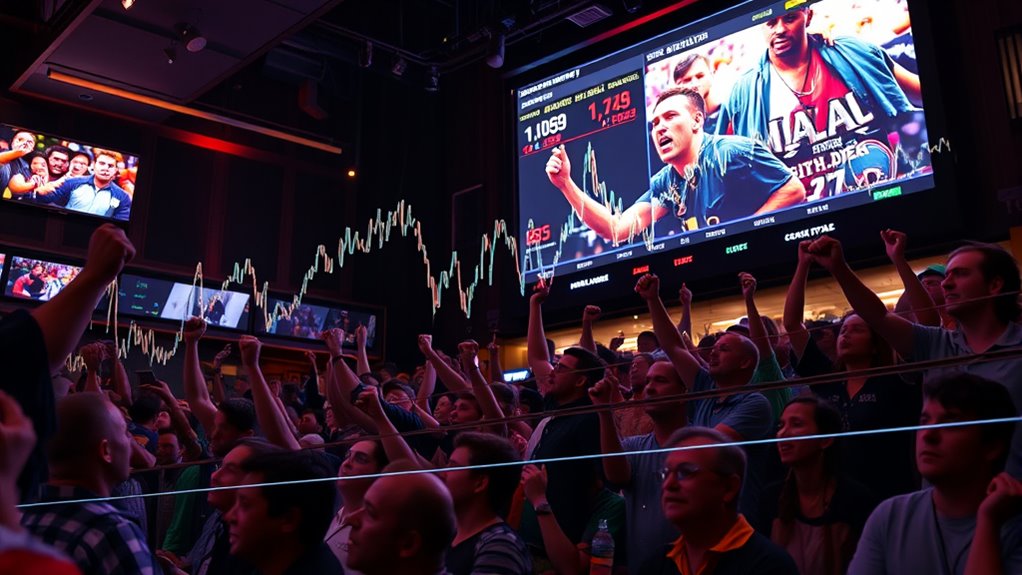
You need to contemplate that sentiment data can be unreliable due to noise and bias, which may distort your analysis. Additionally, market changes are influenced by many factors beyond fan mood, such as injuries or external events. These challenges make it difficult to directly link sentiment to betting odds with certainty. For example, decor elements like vintage decor or natural materials, while enhancing aesthetic appeal, do not directly impact market dynamics.
Sentiment Data Reliability
While sentiment data can offer valuable insights into public opinion, its reliability in predicting market movements remains limited by several factors. Fan sentiment, although influential, doesn’t always translate directly into betting odds changes due to data reliability issues. Here are key challenges:
- Variability in data sources, which can skew sentiment interpretation.
- The presence of bots or fake accounts that distort true fan sentiment.
- Limited sample sizes that may not accurately represent the broader fan base.
- Data quality issues that further complicate accurate sentiment analysis.
These factors can lead to inaccurate readings of fan sentiment, reducing its usefulness as a reliable predictor. As a result, relying solely on fan sentiment for market predictions can be risky, emphasizing the need for careful analysis and corroboration with other data points.
Market Influencing Factors
Linking fan sentiment directly to market changes is more complicated than it appears, as numerous factors can distort this relationship. Player performance can shift odds regardless of fan mood, while venue conditions might favor one team unexpectedly. External influences like injuries, weather, or strategic changes also impact betting markets beyond sentiment analysis. To understand these influences better, consider this table:
| Factor | Effect on Odds | Example |
|---|---|---|
| Player Performance | Can override fan sentiment | Star player injury |
| Venue Conditions | Affects home advantage, betting lines | Weather impacting gameplay |
| External Factors | Unpredictable influences | Unexpected player trades |
Additionally, technological advancements in data analysis have increased the complexity of accurately linking sentiment to betting odds.
Future Trends: Integrating Sentiment Analysis Into Betting Strategies

As betting strategies evolve, integrating sentiment analysis from fan opinions and social media chatter is gaining momentum. You can leverage AI predictions and sentiment forecasting to gain a competitive edge. This approach helps you:
- Identify emerging trends by analyzing real-time fan sentiment shifts.
- Adjust betting odds proactively based on predicted public support or opposition.
- Enhance decision-making accuracy by combining traditional data with sentiment insights.
- Utilize vetted tools and models to ensure reliable and accurate sentiment analysis.
Frequently Asked Questions
How Quickly Does Fan Sentiment Impact Betting Odds During Live Events?
During live events, fan sentiment can influence betting odds rapidly, often within moments. Real-time analytics help sportsbooks monitor fan engagement and detect shifts in sentiment instantly. As fans react to game developments, their emotions and opinions can sway betting patterns quickly. You’ll notice odds adjusting almost immediately as sportsbooks interpret these real-time signals, emphasizing the powerful connection between fan engagement and odds movement during live sports, making it a dynamic and fast-paced process.
Can Negative Fan Sentiment Lead to Market Manipulation or Betting Scandals?
Negative fan sentiment can influence betting markets by creating sentiment bias, especially if influential groups sway public opinion. While this might not directly lead to market manipulation, it can contribute to biased odds and potentially shady activities if individuals attempt to exploit sentiment shifts. As a bettor, stay cautious of sentiment-driven moves and recognize that fan influence can sometimes distort fair betting practices, increasing the risk of scandals.
What Tools Are Most Effective for Real-Time Sentiment Analysis in Sports Betting?
Oh, the irony is rich—you’re trying to decode fans’ feelings in real-time. Sentiment analysis tools like natural language processing help you gauge emotions from social media, news, and forums, while data visualization makes these insights clear at a glance. These tools allow you to spot trends, react swiftly, and make smarter bets. Embrace them, and you’ll see the game—and the crowd’s pulse—more vividly than ever.
How Do Different Sports or Leagues Vary in Sentiment and Odds Correlation?
Different sports and leagues vary in sentiment and odds correlation because of factors like league rivalry and regional differences. You’ll notice that intense rivalries boost fan sentiment, which often influences betting odds. Regional preferences also shape perceptions, making some leagues more predictable than others. By understanding these variations, you can better interpret sentiment and odds, giving you an edge whether you’re betting on popular leagues or lesser-known competitions.
Are There Ethical Concerns With Using Fan Sentiment Data to Influence Betting Strategies?
You might worry about ethical concerns when using fan sentiment data in betting strategies. Fan bias can skew data, leading to unfair advantages or misjudgments. Additionally, data privacy is vital; collecting and analyzing fan opinions without consent could breach privacy laws. Always guarantee transparency and respect for privacy rights, and consider how relying on sentiment might influence the integrity of betting practices. Staying ethical helps maintain fair play in the betting community.
Conclusion
Did you know that studies show a 45% correlation between fan sentiment and betting odds movements? By tapping into social media and surveys, you can better anticipate market shifts and make smarter bets. While emotions aren’t the only factor, understanding the psychological impact of fan moods gives you a competitive edge. As sentiment analysis becomes more integrated, staying ahead of these trends could markedly improve your betting success.









